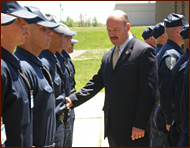College of Humanities & Social Sciences
College of Humanities & Social Sciences
From State Police Superintendent to State Senate
There's a drumbeat of stiff black shoes at the Gloucester County Police Academy as 30-odd raw recruits move through daily drills.
The recruits huff and puff in silence, grunt on command and make precision turns. Again. And again. And again.
Drills complete, the candidates stand at attention as State Sen. Fred Madden, a Glassboro State College alumnus and interim director of the police academy in Sewell, evaluates them head to toe.
"Secure your weapon," he tells a recruit whose plastic training gun is less than properly fastened.
"Eyes ahead," he tells another, evaluating the trainee's posture and attention.
Calm, unflinching and deadly serious when he needs to be, Madden tells a visitor the drills and inspections are far more important than a casual observer might presume.
"It's all about safety, procedure and discipline," he says. "This is where it begins."
Book smarts help build street smarts
Madden, a 1980 GSC graduate with a BA in law and justice, was recognized April 16 with a Most Distinguished Alumni Achievement award during the Law and Justice department's annual career day.
Certainly, it's a career worth emulating.
He spent 28 years with the N.J. State Police, rising through the ranks from entry-level trooper to superintendent -- head of all State Police operations -- before retiring in 2003 to seek a senate seat.
In addition to his position as interim director of the Police Academy, he is interim dean of public safety at Gloucester County College.
Though the State Police now require a bachelor's degree, when Madden joined the force in 1975 all they required was a high school education. Still, he pursued and earned his baccalaureate degree.
"I just felt the future of policing was going to be built upon knowledge," he says. "I've raised my children and lived my life with the philosophy that you try to improve yourself."
Madden believes the degree paid dividends almost immediately. The year he graduated he was promoted to a plainclothes crime analyst position. He continued his education, trained with the FBI, and earned a master's degree in criminal justice from St. Joseph's University. All of it, he believes, helped him ascend the hierarchy of the State Police.
"The leadership sees individuals who are self-motivating (and recognize them for it)," he says.
To serve and serve
Madden considers his election to public office an extension of the work he did in the State Police.
For example, as a state police officer, residents wanted him to help keep their streets safe and crime free.
That's still his mission today but he works at it legislatively.
He believes his State Police background was critical in both his election to the senate and the voice he brings to certain issues but, perhaps equally so, was the classroom experience.
"The skill sets you develop in college are very beneficial in both police work and in the senate," he says. "The ability to get along with people is key to getting ahead both in law enforcement and politics."
In fact, Madden believes, law enforcement is one of life's great callings and he encourages young people to pursue it.
"It's way more than catching speeders," he says. "Law enforcement provides some wonderful opportunities for individuals who want to make a difference and serve their community."
Early signs?
Dr. Stanley Yeldell, a Rowan University Law and Justice professor for 32 years, said he expected big things of Madden as an undergrad and wasn't disappointed.
"This man knows how to hunt," Yeldell says. "He knows his way around and knows what it takes to get to the next level. I expected the yield of his life to be pretty much what it was."
Yeldell noted that Madden, like other successful Law and Justice graduates, made the most of a good program that has gotten even better with time. Other successful L&J graduates include Camden City municipal judge Teofilo Montanez-Santiago; Leslie E. Folks, a lieutenant in the Atlantic County Prosecutor's Office and chief Frank T. Rodgers of the Harrison Township, N.J. police department.
"This is a diverse program," Yeldell says. "You get an insight into the legal and practical applications of the field. Our students do very well in the field because they've had the background."
He said an all-new Master of Arts in Criminal Justice provides an even deeper background and greater opportunities for advancement.

State Sen. Fred Madden



